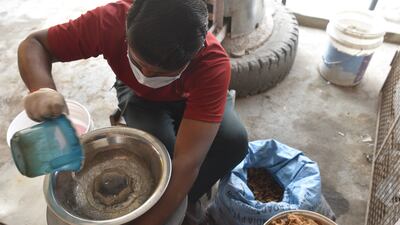In a nondescript settlement outside New Delhi is the heart of one young man’s efforts to keep cigarette butts from polluting India’s environment.
Naman Gupta’s factory is behind a gate at the end of a narrow lane with overflowing sewage and loitering water buffaloes, surrounded by sacks of cigarette butts that would otherwise be littering streets, fields and waterways.
“Smoking is prevalent everywhere. But only a handful of people think of recycling this or even of what exactly happens to their cigarette butts,” Mr Gupta, 28, told The National during a visit to the factory in Nangli village.
His company, Code Effort, launched in 2018, turns the toxic cigarette ends into stuffed toys, cushions, paper bags, notepads and even mosquito repellent.
“Code” in the company's name is an acronym for “conserving our depleting environment”.
Contrary to common perception, the filters in cigarette butts are not made from natural cotton, but from fibres of cellulose acetate, a plastic compound that takes up to 10 years to decompose.
Even worse, they contain chemicals absorbed from cigarette smoke, including nicotine, arsenic and heavy metals, that can be acutely toxic to aquatic organisms, according to the World Health Organisation.
According to the WHO’s tobacco control body, cigarette butts are the most discarded waste item in the world, accounting for about 766 million kilograms of toxic rubbish each year.

From an estimated six trillion cigarettes smoked each year, about 4.5 trillion butts end up littering the environment, according to a study published in the Science Direct journal in May last year.
India, with about 267 million adult smokers, the second-highest number in the world after China, accounts for a sizeable share of this waste.
The seriousness of the problem prompted Mr Gupta, a non-smoker from Delhi’s satellite city of Noida and a chartered accountant by training, to look for solutions.
“I witnessed a lot of problems in our own city because of cigarette butts. I realised that in India there are no solutions regarding cigarette waste,” he said.
Together with his elder brother Vipul, a civil engineer, Mr Gupta formed Code Effort and set up India’s first, and so far only, factory for recycling cigarette butts.
They started by working with just 10 to 15 grams of cigarette butts a day, but this has grown 1,000 to 1,500kg daily after they developed a network of 2,500 ragpickers across the country who get paid about 250 rupees ($3) for every kilogram they send.
Recycling of the butts begins with workers at the factory cutting them apart to separate the paper, filter and tobacco.
The paper is pulped and recycled into notepads, paper bags and mosquito repellent, while the tobacco is turned into compost and sold to local gardeners and nurseries.
The filters require more complex processing to turn them into fluffy fibres used as stuffing for cushions and soft toys, among other products. They are first shredded by machine and soaked in water to soften the material. The pulp is then soaked in a mixture of biodegradable organic chemicals for at least 24 hours to remove all the toxins and turn it white.
An industrial dryer is used to remove the moisture, after which the fibres are fluffed up in a carding machine and ready for use.
The water used in the process is recycled, while the toxins extracted are chemically treated and added to the compost pit.
Mr Gupta said he and his brother developed the products made from recycled butts through years of trials and tests.
They sell the products online through their website and take orders from businesses, such as MG Motors and the US cloud-based software company Salesforce.
Mr Gutpa said they are also developing an air-purifier using recycled cigarette filters.

By the end of March last year Code Effort had recycled more than 1.2 billion cigarette butts, he said, but there is scope to do much more. According to market research group Euromonitor International, nearly 81.3 billion cigarettes were sold in India in 2017.
The company has provided employment for about 100 women in the area, most of them uneducated, who make the products from recycled butts, such as stuffed toys, paper bags and notepads.
“Initially the women and the entire village population were a bit reluctant, but we explained our cause to them and started providing them opportunities to work with us,” Mr Gupta said.
“These women are unable to go outside to work and because of their educational background, they don't get many opportunities, but with us they can look after their parents, children, do household chores, and also make money,” he said.
Mr Gupta tries to raise awareness about the threat cigarettes pose to the environment and to health by holding workshops for school pupils and college students and people who want to quit smoking.
“We are not against those who smoke,” he said, but it is “best to highlight the danger cigarettes pose to the environment, just as they affect health”.
















